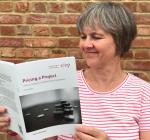Would you sign up for a two-hour conference session titled ‘Risk Assessment for Editors and Proofreaders’? Perhaps a few people would. (I might even be tempted myself, because I have some experience of editing and writing safety-related content.) But SfEP conferences always aimed to entertain as well as educate: after all, that’s one of the best ways to learn. So I needed to come up with a new twist on an apparently dull but important topic for my slot at the 2018 event.
After a bit of head scratching I came up with an idea: ‘Don’t Panic! How to stay calm in a crisis’ – a workshop that challenged my unsuspecting victims keen and willing editorial colleagues to play a giant interactive board game: The Game of Editorial Life.
Spinning plates
Freelance editorial professionals need to keep a lot of plates spinning – marketing their services, juggling client expectations and moving deadlines, chasing invoices, and keeping up to date with technology. And there are other plates spinning in the background – both business and personal – that must not be ignored.
Life happens and plates may crash but, by thinking ahead and preparing for the worst, we can avoid many problems, and survive most of the rest.
When I say ‘survive most of…’ I do mean just that. There is one inevitability that we all face (and I don’t mean your tax bill), and we need to think about that too.
The Game of Editorial Life enabled like-minded professionals to think about ways to plan ahead to avoid a number of work-related crises – from electricity outage to hacked computers via vanishing clients. But we also discussed strategies to deal with non-work events that can have an impact on our capacity to work and therefore pose a risk to business continuity.
Among those was one I want to focus on here: the round I named ‘Unhappy families’.
Unhappy families
If you are an employee you will have access to paid holiday, sick leave, maternity/paternity and other benefits. And there will usually be someone else on hand who can cover for you if you have to dash off because of a family emergency. This is relevant even if you don’t have a ‘family’ in the traditional sense – pets have crises too as, of course, do close friends. More important, you yourself may have a health crisis (either sudden in onset, or a gradual change that makes working difficult).
If you’re a freelancer, you have to grapple with these things while still keeping your work plates spinning.
Or do you?
In the workshop, I presented the competing teams – yes, it really was a game (with forfeits, and prizes) – with various scenarios and asked them to make a crisis plan by answering the following questions:
- Triage – what do you do first, second …?
- Do you tell your clients?
- If so, when and how?
- What could you do to be better prepared for this sort of crisis?
Grab a pen and some scrap paper and have a go yourself. Here are a couple of scenarios:
- You have landed a really exciting project, but a few days in you’re starting to feel really ill, with flu-like symptoms.
- You get a call one morning that a close family member/friend has been taken to hospital in an ambulance.
In the workshop discussion our ideas for all the scenarios coalesced around these key points:
- Remember the flight attendant – put on your oxygen mask (ie, look after yourself so you can care for others).
- Consider health/dental insurance.
- Have regular health checks.
- Regular breaks/holidays.
- Consider loss of earnings insurance (it can be very expensive) – not to be confused with payment protection insurance (which often doesn’t work for the self-employed).
- Know where to seek local help.
- Tap into your network – local and remote (CIEP colleagues are perennially generous with their time and empathy).
- Talk to your clients – they are humans.
Extras you might consider for scenarios 1 and 2 above are: get vaccinated; and keep emergency numbers handy.
On that latter point, the entire workshop was built around developing an emergency plan and all the participants went home armed with a business resilience booklet that acts as an aide memoire for all the lively and useful discussions of the day, as well as a place to write down essential information that you – or your nearest and dearest – can easily find in a crisis.
I have mine pinned on my kitchen noticeboard.
As I mentioned at the beginning, crises don’t bother to phone you up and plug themselves into your busy schedule, they just happen. Mine, post-conference, was a call from a stranger to say that my son had crashed his car. I was in the middle of work for a client, and had an ill pet waiting to go for a walk. Of course, I dropped everything and dashed to the scene (son was fine, by the way) but I was very glad I had spent time while writing the workshop to think about my own ‘don’t panic’ strategy.
Remember:
- Don’t leave things to chance.
- Make plans.
- Review them regularly (eg, once a year).
Further reading
- Who would contact your clients if you got hit by a bus?
- 5 crisis management tips for freelancers
- Business Emergency Plan: How to Create a Backup Plan as a Business Owner
- On the Basics — A Fresh Look at Coping with Emergencies
 Melanie Thompson (CIEP APM) has worked in and around publishing since 1988 and has just begun her 20th year as a freelancer. She writes and edits materials on sciences, especially climate change – a topic worth panicking about – from her home in a small village on the Herts/Beds/Bucks border. She’s an CIEP tutor. Follow her on Twitter via @EditorSpice
Melanie Thompson (CIEP APM) has worked in and around publishing since 1988 and has just begun her 20th year as a freelancer. She writes and edits materials on sciences, especially climate change – a topic worth panicking about – from her home in a small village on the Herts/Beds/Bucks border. She’s an CIEP tutor. Follow her on Twitter via @EditorSpice
All illustrations © Paul Dyett 2018
Proofread by Joanne Heath, Entry-Level Member.
Posted by Abi Saffrey, CIEP blog coordinator.
The views expressed here do not necessarily reflect those of the CIEP.
Originally published April 2019; updated June 2021.




Excellent post, thank you, Melanie. I came to your conference workshop and went straight off to do my own resilience plan, which has since been sitting on my desk just in case. This post has reminded me to update it…
Oh thank you, Hugh. Glad it’s been helpful.
Keeping info up to date is very important. (I could tell you a long and sorry story of how I learned that the hard way.)